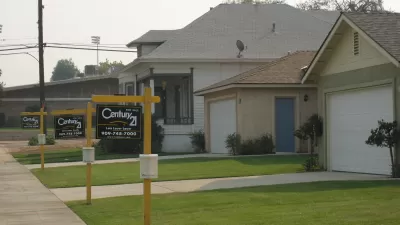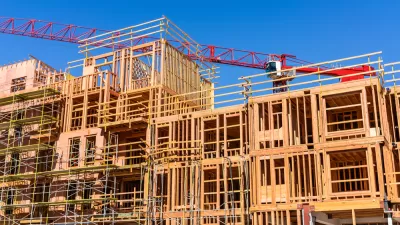Two assistant professors from the University of Chicago and BYU have found that the addition of a Wal-Mart store in a neighborhood can raise the value of homes within a mile of the store, reports Mary Ellen Podmolik.
Brothers Devin and Jaren Pope, who are assistant professors at the University of Chicago's Booth School of Business and Brigham Young University respectively, were researching "the effect of cell towers, airports and steel mills on property values" when they decided to extend their analysis to the effect of Wal-Mart stores on property values. Mary Ellen Podmolik reports on their newly published findings, "that values increase an average of 2 to 3 percent for homes within half a mile of a Wal-Mart store and 1 to 2 percent when the home is a half mile to 1 mile from a store."
Even though Wal-Mart tends to be charged with hurting small businesses and the local community, Devin Pope says, "...what's nice about looking at housing values is that housing values reflect the positive and the negative of what a Wal-Mart can bring. It gives a nice way of looking at the net effect of Wal-Mart."
"‘On average, the benefits to quick and easy access to the lower retail prices offered by Wal-Mart and shopping at these other stores appear to matter more to households than any increase in crime, traffic and congestion, noise and light pollution or other negative externalities that would be capitalized into housing prices,' the professors wrote."
Thanks to Akemi Leung
FULL STORY: The Wal-Mart effect on homes

Alabama: Trump Terminates Settlements for Black Communities Harmed By Raw Sewage
Trump deemed the landmark civil rights agreement “illegal DEI and environmental justice policy.”

Study: Maui’s Plan to Convert Vacation Rentals to Long-Term Housing Could Cause Nearly $1 Billion Economic Loss
The plan would reduce visitor accommodation by 25% resulting in 1,900 jobs lost.

Why Should We Subsidize Public Transportation?
Many public transit agencies face financial stress due to rising costs, declining fare revenue, and declining subsidies. Transit advocates must provide a strong business case for increasing public transit funding.

Wind Energy on the Rise Despite Federal Policy Reversal
The Trump administration is revoking federal support for renewable energy, but demand for new projects continues unabated.

Passengers Flock to Caltrain After Electrification
The new electric trains are running faster and more reliably, leading to strong ridership growth on the Bay Area rail system.

Texas Churches Rally Behind ‘Yes in God’s Back Yard’ Legislation
Religious leaders want the state to reduce zoning regulations to streamline leasing church-owned land to housing developers.
Urban Design for Planners 1: Software Tools
This six-course series explores essential urban design concepts using open source software and equips planners with the tools they need to participate fully in the urban design process.
Planning for Universal Design
Learn the tools for implementing Universal Design in planning regulations.
Caltrans
Smith Gee Studio
Institute for Housing and Urban Development Studies (IHS)
City of Grandview
Harvard GSD Executive Education
Toledo-Lucas County Plan Commissions
Salt Lake City
NYU Wagner Graduate School of Public Service





























